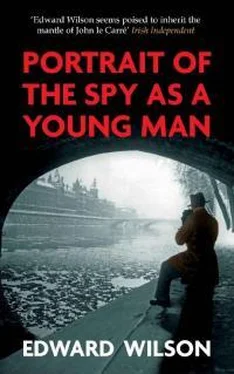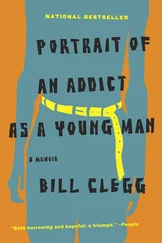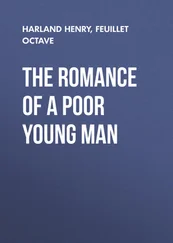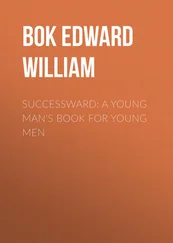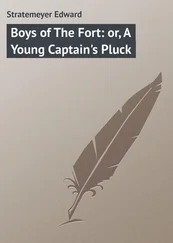After the climb, the roof itself was a midnight paradise with dark silhouettes of blacked-out Cambridge, a vista that could only be enjoyed by the secret cabal who took risks. It was, in a way, similar to the excitement that Catesby would later feel as an SIS intelligence officer. The EYES ONLY files provided a top secret view of the world and Britain that only the privileged few were allowed to see.
Once the roof was achieved, there was still one more climb: The Tottering Tower. The tower was about thirty feet high, but an easy climb because its elaborate ornamentation provided lots of hand and footholds – but, illusion or not, the tower seemed to wobble more and more the higher you got. Once he reached the cross on top of the tower, there was one more thing for Catesby to do. It was pointless to execute these high-risk climbs and not leave a mark. Catesby reached inside his jacket and pulled out his blue-and-white Ipswich Town football scarf. The tower seemed to sway as he tied the ITFC scarf to the top cross. Done.
The next morning, as the Ipswich Town scarf blew defiantly in the wind, the university authorities scratched their heads in confusion. ‘Footer’ was not a game popular among the undergraduates – particularly the sort who surreptitiously climbed towers. Their sports tended to be rowing, rugby, tennis and fencing. The fact that the scarf was that of a local East Anglian team pointed away from the assumption that all the climbers were undergraduates. One of the proctors shrugged. ‘Well, I never,’ he shook his head in disbelief. ‘It looks like the townies have got involved.’ Although Catesby didn’t realise it at the time, the incident became his first successful deception operation.
Catesby’s final climb was in the spring, just before he left Cambridge for the army. His objective was to reach the top of one of the spires of King’s College Chapel. A few years before, the Night Climbers had celebrated the coming Christmas by decorating the tops of all four spires with party hats and tinsel. But neither Catesby nor the others had any intention of leaving a physical marker on this occasion. They had an audience instead – women from Homerton College who had come to bid farewell. Like Catesby, all four of the Night Climbers were leaving for the army. To serenade the Homerton women, the climbers had snatches of poetry they were going to proclaim from the pinnacles of King’s Chapel.
As soon as it was Catesby’s turn, he felt a bit awkward. All the other recitations had been light-hearted and in English – or Scots. The Homerton girls had given a special round of applause to Strachan’s rendition of Burns:
He set his Jenny on his knee,
All in his Highland dress;
For brawly weel he kenned the way
To please a bonnie lass.
Catesby was next. He was sure his opening words made things worse. ‘ Je vous demande pardon, this isn’t going to be very interesting.’ He then launched into the Rimbaud he had chosen because it seemed apt to recite when clinging to a King’s Chapel spire at midnight: ‘J’ai tendu des cordes de clocher à clocher; des guirlandes de fenêtre à fenêtre… ’
Catesby was interrupted by a refined and peremptory voice, surely a headmistress in the making. ‘Don’t be a showoff, give us the lines in English.’
‘As you please, madam,’ said Catesby. ‘ I stretched ropes from bell tower to bell tower; and garlands from window to window; then chains of gold from star to star, and now I dance. ’
After he had finished, there was one lonely set of hands clapping. He met her three times the following week.
‘I’m not very good at French,’ she said, ‘but I still think it was rude that Constance interrupted you. I can, however, speak some Punjabi and a little Hindi.’
‘Which I am sure are more difficult than any European language.’
‘My ayah taught me. She was infinitely patient.’
They were walking along the Backs. It was a perfect spring day and there was a lot of punt traffic on the river. Striped blazers, boaters – and too-soon-donned summer dresses draped with scarves and cardigans for warmth.
‘How,’ said Catesby, ‘did you end up in India?’
‘My father’s first regiment, a mounted one, was a bit too smart for his bank account – particularly with a family to look after. So, Daddy transferred to a regiment of foot, which meant going to India. And how did you end up speaking such marvellous French? I bet you lived there.’
‘I’ve never been to France. Never been outside England. My mother’s Belgian.’
‘How incredibly interesting.’
Catesby inwardly squirmed, but kept smiling. He thought that she was patronising him as a ragamuffin from the Lowestoft docks. But then he realised that her comment was genuine. She knew so little about him. She really did think that he was one of them – and wasn’t it curious that his family had never taken him abroad? For the first time, Catesby realised how much he had changed. At first, he had imitated the voices and manners of those around him because he didn’t want to stand out. But it was no longer imitation, the changes had become a part of him.
‘That French you recited. One of my clever friends said it was Baudelaire.’
Catesby’s smile turned warm and sincere. ‘It was Rimbaud. He was a bad boy.’
‘Oh, I love bad boys. Are you one?’
‘I’m willing to take lessons.’
A week later she led him across Clare Bridge just as dusk was falling. There was a field with cows. She climbed the gate first. Catesby’s heart had already begun to pulse with desire as her body swayed in front of him. When they were out of sight of any passers-by in the lane, she turned to him, ‘Has anyone ever told you how strange you are?’
‘I…’
‘Don’t answer. Just kiss me.’
Her tongue rooted in his mouth like a demented serpent. He drew her close in a haze of desire. Then she broke off the embrace.
‘We need to find a spot,’ she said, ‘where there are no cow droppings. I don’t want my mac smeared with cow poo.’
‘Are you always so romantic?’
‘You can be romantic and practical at the same time.’
‘I don’t think the cows have been in this field long. The grass looks hardly cropped at all.’
‘I was right. You are a bit of a country boy.’
They found a clear space where there were no cow pats or anthills. Catesby helped her out of her mac and spread it on the ground. She was only a year older than Catesby, but much more experienced. She took his virginity with loving care – and, after a brief rest, she rode him, her hips moving in syncopation like a well-oiled machine, into another round of lovemaking.
Catesby kept in touch with her all through GMT (General Military Training) and when he was in OCTU (Officer Cadet Training Unit). Writing and receiving letters wasn’t a problem then – and even encouraged as a leisure activity that kept up spirits. But once he began training with the Special Operations Executive, letters – and all other forms of outside contact – were, although not expressly forbidden, discouraged. The rules were strict:
1. All letters will be handed to the House Commandant in a stamped unsealed envelope for censoring. You must not mention or even suggest that your letters are censored. All of your letters will be posted from London regardless of your actual location – which must never be mentioned or hinted at.
2. Your address for receiving letters will be the Post Box address given to you on arrival. No other address is permitted.
3. Incoming letters. All letters addressed to you will be read and censored. If they are not suitable, they will either be returned to sender marked ‘Addressee Unknown’ or destroyed.
Читать дальше
